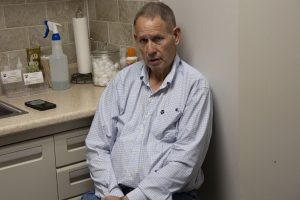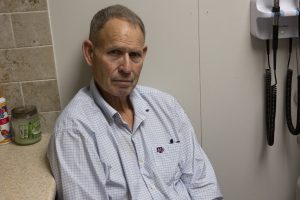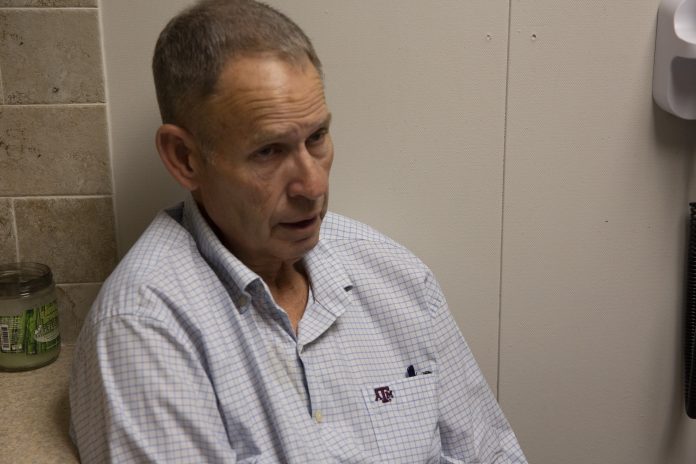After 43 years in practice as a veterinarian, Dr. Henry Lide probably knows just about every person and pet in Odessa.
But after four-plus decades, Lide has decided to retire and sell his University Small Animal Clinic on University Boulevard.
He had been at that location since 1995, having moved from a spot on 42nd Street.
When he’s officially retired, Lide said he has about 100 Angus and Angus cross cattle he plans to take care of on some land he leases near Alpine.
“It gives me an opportunity to enjoy the animal end of it. It’s not highly intensive. It’s not a deal where I’ve got to work on them every day, but it gives me an opportunity to look at living, breathing things. I enjoy that part of it,” Lide said.

In his practice, Lide saw mostly what he calls companion animals, such as dogs and cats. He’s also treated pocket pets, birds and some large animals like horses and cattle when he first got out of school.
“It wasn’t my bread and butter. I did it more on the side than I did full time,” Lide said.
Lide grew up in El Paso and went to Eastwood High School where he graduated in 1973. He went to Texas A&M University where he earned his bachelor’s of veterinary science in 1978 and his doctor of veterinary medicine in 1979.
Lide grew up with pets, rode horses and took part in rodeos.
“… I’ve grown up around animals since I was very little,” he added.
He decided to become a veterinarian to be a professional.
“I didn’t want to be a human doctor because I really don’t like hospitals. I had a brother-in-law that got into med school and I liked the idea of doing medicine. I like the idea of my patients not talking to me, so it’s kind of a win-win,” Lide said.
“I enjoy my patients, but they’re pretty quiet most of the time and they don’t backtalk me or say things that they shouldn’t, so it’s a good deal,” he added.
He’s seen a wide of variety of animal predicaments — dogs that have eaten Play-Doh, which hardened and couldn’t be passed, so they removed it; a dog that ate a full meal and got ahold of some Gorilla Glue and that formed one big dog kibble and Gorilla Glue glob in the stomach of the dog and they had to remove that; and a dog that ate about 4 pounds of gravel rock that they had to remove.
Lide said there were several factors that went into his decision to retire.
“I had some health issues. I had a knee replaced and I had back surgery. Being a veterinarian is pretty physical and I couldn’t really do the things that I really needed to do as much as I needed to,” he said.

Lide also worked 70-80 hours a week and felt like he couldn’t keep up that pace anymore.
“You’ve got to figure (out) what your exit strategy is. … I will be 68 and I really didn’t know when it was time to retire, to be honest with you. I love my work. I love things that are about my work, but I just didn’t know if I could sustain what I’ve sustained over the past 40 years,” Lide said.
He has enjoyed the challenges of taking care of animals and the professional joy.
“I’ve enjoyed the interaction with clients and the patients. I know lots of people from taking care of their animals. Of course I can’t remember the people’s names as much as I do their animals’ names,” Lide said.
Most veterinarians are pretty transparent. They try to help where they can and if they can’t, they try to point people in the right direction, he said.
“It’s a very humble profession; a very family-oriented profession. You have different perspectives. The grandparents have animals a lot of times because they no longer have children. The parents have pets because they want their children to grow up with pets. The young couple doesn’t have children yet, so they have an animal. The dynamic of veterinary medicine is a lot of different family units take care of the different animals in people’s lives. People tend to downsize when they get older, so they normally have smaller pets. But most of the time people have pets for companionship; for somebody to tell all your secrets to and they won’t tell anybody. In order to have a dynamic in the family where you have somebody to take care of, because a lot of people if they don’t have somebody to take care of they don’t do well. A lot of people that are shut in or people that are diminished, they like having something to take care of,” Lide said.
“It’s a challenge for them, but it’s better to get up and be mobile than just sit there and not be mobile and the pet enables them to have a purpose and have something to spend their time with …,” he added.
Lide would make house calls when people wanted to put their pet to sleep and didn’t want to come to the clinic.
“It’s the toughest thing I have to do as a professional, and sometimes in the home environment it’s not easier for the client, but it is where the animal is … normally. They are more comfortable,” Lide said.
Lide is married to his wife, Amy. He has four children with his first wife and four grandchildren. His son Aaron is a veterinarian in Waco.
He and his wife have two inside dogs, three outside cats, four inside cats and two outside dogs. His wife is involved in rescue groups and bottle feeds the animals.
Lide also is on the board of Odessa Animal Control and helps with consultations.
He tells everybody he was born in the desert and he’s going to die in the desert.
“I just liked the dry heat a lot better than the moist heat. I enjoy the West Texas mentality and openness. And I enjoy the people here. I guess that’s one of the things I enjoy the most is just the people of West Texas. It’s a certain type of person that lives out here. They’re not like any others that I’ve ever met,” Lide said.
Initially, he plans to split time between Odessa and the land where he cares for cattle. He and his wife are also planning to take a cruise around the British Isles and go to Scotland and Ireland and he’ll do some relief work for his son.
Lide said he tells people, people make the place, not vice versa.
“… I know if I’m around the people I love and (have) been used to I’d just as soon stay in that place,” Lide said.
Longtime friend and client Phil Fouche has used Lide as a veterinarian for about 20 years.
“He’s one of those guys that you really look forward to seeing and you really care about him,” Fouche said.
Fouche travels to China and when he’d go to see Lide, Lide would ask him to tell him all about his trip.
“It was October of 2020 and my female dog Sanders had a cat cornered. I thought it was a squirrel or something. It ended up being a cat, but he didn’t know I was behind him and I reached around there to get him and my dog turned around and ripped my left index finger all the way from the base to the middle knuckle,” Fouche said.
“I’m standing there and I’m bleeding, but I realize I need stitches and of course remember this is COVID. I looked at (his wife) Cindy I said I don’t want to get sewed up at the hospital,” he said.
When Cindy called his office they were told Lide was in surgery.
Fouche said to tell them it was Fouche, he’d ripped his finger wide open and could Lide sew him up.
“She put me on hold she says come on down. … We went in there; they surgically got me ready and we laughed — I kind of laughed as much as I could laugh — all the way through … him sewing me up. He did a great job. All my friends kid me, but I said let me tell you what, Henry will take care of you and your dogs,” Fouche said.
Fouche said Lide didn’t charge him to sew his finger up and Fouche’s first Yellow Cat book has Lide as a character in it.
He told Lide that not only did he have the opportunity to sew up Fouche’s finger, but Lide got a book for it “and I named a character in the book for you.”




